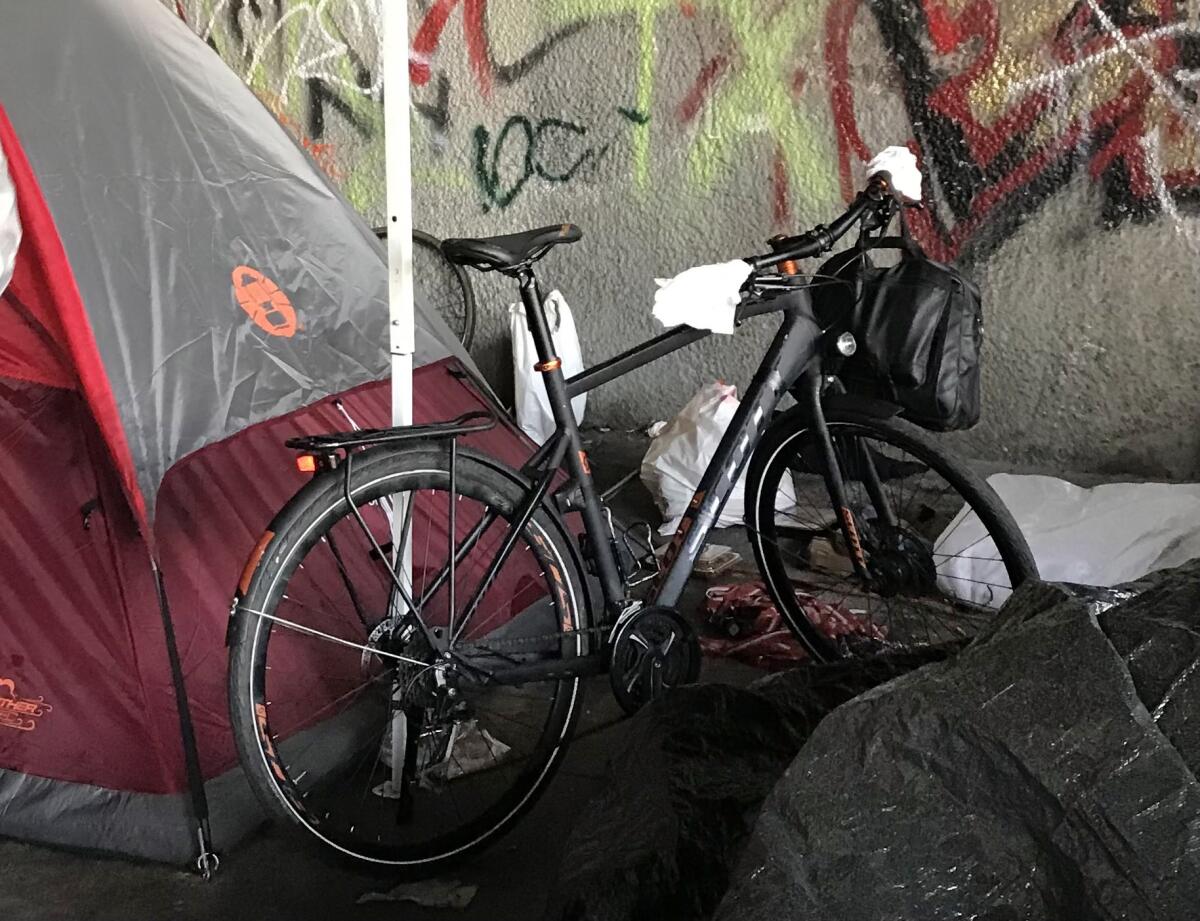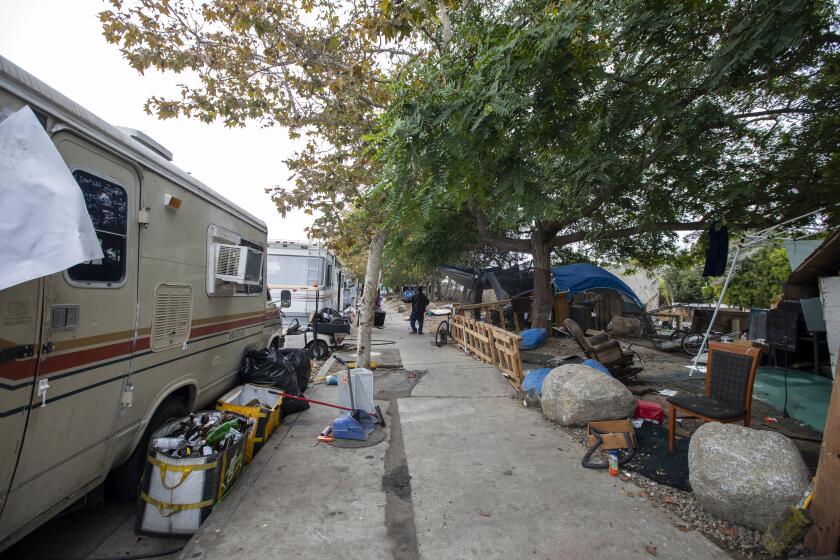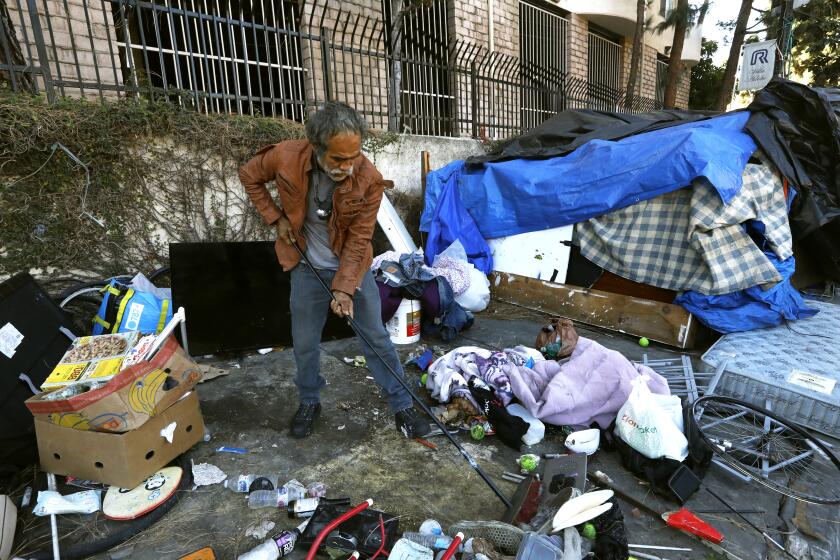A bike goes missing, a chit in L.A.’s homeless economy

- Share via
James Weitz has no trouble approaching strangers; it’s what he does for a living.
He’s a documentary filmmaker who is also hired by companies to find real people for their commercials. “I must interview 3,000 people a year,” he told me.
So when he discovered that someone had broken into his Mar Vista garage in the wee hours of a recent Friday morning and stolen his three precious road bikes — which were locked to a wooden table — he decided to try to get the bikes back by approaching strangers.
“One of the bikes has tremendous sentimental value for me, and the thought of losing it and replacing it was too much,” he told me. “It got me through COVID.”
The day after the theft, Weitz said he hopped into his two-door sedan and drove around to nearby homeless encampments, where he had often seen a strangely high number of bikes. He struck out.
But later that afternoon, on his way to a grocery store, he spied his unmistakable shiny red Cannondale in an encampment under a freeway overpass. He pulled over.
A guy sat on a new-looking couch next to the Cannondale, smoking.
“I said, ‘That’s my bike,’” said Weitz. “And he said, ‘I just paid $100 for it.’”
Weitz happened to have a $100 bill in his pocket and handed it over.
“Before the guy could change his mind,” he told me, “I took the bike to the car.”
And then he wondered if his two other bikes were there as well.
“I said, ‘I am gonna have one more look.’ I lifted up a tarp, and my bikes were there. I said, ‘I am taking my bikes and I am not paying for them.’ The guy started apologizing.”
Weitz ended up chatting with some of the other denizens of the encampment and came to suspect that it’s part of at least a semi-organized ring.
One of the residents, who identified himself as a “mechanic,” pedaled off on what Weitz estimated to be a $4,000 carbon fiber bike. In all, Weitz reckoned, there might have been about $15,000 worth of bikes under the tarps.
::
On Monday morning, I called the Los Angeles Police Department’s media relations shop to ask about how the LAPD handles reports of bike thefts, and whether there is any dedicated bike theft unit. (There is not.)
“If the victim decides to file a report, do we have someone who runs out and looks? No,” said Sgt. Drake Madison. “Lots of times, owners don’t have serial numbers, so it makes it difficult to get the bike back.”
Weitz had tried to file a police report online. Because his garage was broken into, he was told, he would have to file in person. But his local LAPD outpost in West Los Angeles is not allowing walk-ins because of COVID-19. So he went to the Pacific Division station on Culver Boulevard but was told he had to file it in West L.A.
“My local lead officer said he would get in touch after I file my police report,” said Weitz, “but I can’t file my police report, so he can’t call.”
On Monday afternoon, Weitz and I retraced his steps to see what we could suss out about the relationship between some homeless encampments and stolen bikes.
Our first stop was in Mar Vista. The encampment had been cleaned out by the city just that morning; the hundreds of bikes Weitz had seen the week before were gone. Gone, too, was the woman he said had offered to find his bike in exchange for a can of Four Loko.
Frustrated neighbors who live near the Venice Boulevard encampment are exhausted by the amplified music, constant fighting, drug dealing and threats.
A man named Sean told us that if we were looking for bikes, we should go to a particular freeway overpass and ask for a man I’ll call T.
We drove over, and asked around for T, who poked his head out of a tent.
“My bikes were stolen,” Weitz said. “Where would they go?”
“They would come here,” T replied.
“And then what do you do with them?” Weitz asked.
“I usually sell them,” T said. “I’m not trying to get rich. I am just trying to make a living.”
“I got a bike for sale,” another man chimed in. “It’s a Scott. I paid $1,200 for it. I will sell it for 8.”
When we said we weren’t interested, he said, “Check it out! I will go down to 5!”
Everyone with whom we spoke was well informed about expensive bikes, the various brands, what they are made of, their special features. And everyone told us they do not steal bikes; they buy them and resell them.
Los Angeles has undertaken a major shift in its approach to homelessness, one that puts a priority on clearing unsightly street encampments.
Weitz walked over to a pile of silver cartridges scattered on the ground.
“What are those for?” he asked.
“BB guns,” replied T.
Maybe. As it happens, the little cartridges contain CO2 and are often used to inflate bike tires quickly.
Our final stop was the encampment under the Santa Monica Freeway where Weitz had recovered his bikes. The day Weitz paid to get his own bike back, someone had come out of a nearby cannabis dispensary and recorded him.
“I said, ‘Excuse me. Why are you filming me?’”
The man accused Weitz of buying stolen merchandise.
Weitz told him he was half right, and drove home with his bikes.
His favorite, the Cannondale, will now be hung on a wall inside his house. To keep the other two safe, he bought expensive German locks. And fortified his garage.
More to Read
A cure for the common opinion
Get thought-provoking perspectives with our weekly newsletter.
You may occasionally receive promotional content from the Los Angeles Times.













